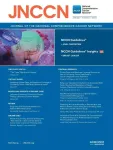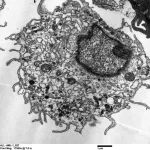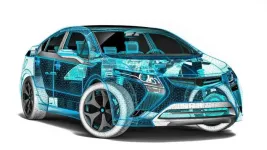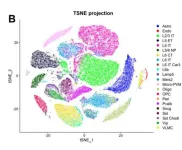(Press-News.org) Researchers led by the University of California San Diego have developed a new model that trains four-legged robots to see more clearly in 3D. The advance enabled a robot to autonomously cross challenging terrain with ease—including stairs, rocky ground and gap-filled paths—while clearing obstacles in its way.
The researchers will present their work at the 2023 Conference on Computer Vision and Pattern Recognition (CVPR), which will take place from June 18 to 22 in Vancouver, Canada.
“By providing the robot with a better understanding of its surroundings in 3D, it can be deployed in more complex environments in the real world,” said study senior author Xiaolong Wang, a professor of electrical and computer engineering at the UC San Diego Jacobs School of Engineering.
The robot is equipped with a forward-facing depth camera on its head. The camera is tilted downwards at an angle that gives it a good view of both the scene in front of it and the terrain beneath it.
To improve the robot’s 3D perception, the researchers developed a model that first takes 2D images from the camera and translates them into 3D space. It does this by looking at a short video sequence that consists of the current frame and a few previous frames, then extracting pieces of 3D information from each 2D frame. That includes information about the robot’s leg movements such as joint angle, joint velocity and distance from the ground. The model compares the information from the previous frames with information from the current frame to estimate the 3D transformation between the past and the present.
The model fuses all that information together so that it can use the current frame to synthesize the previous frames. As the robot moves, the model checks the synthesized frames against the frames that the camera has already captured. If they are a good match, then the model knows that it has learned the correct representation of the 3D scene. Otherwise, it makes corrections until it gets it right.
The 3D representation is used to control the robot’s movement. By synthesizing visual information from the past, the robot is able to remember what it has seen, as well as the actions its legs have taken before, and use that memory to inform its next moves.
“Our approach allows the robot to build a short-term memory of its 3D surroundings so that it can act better,” said Wang.
The new study builds on the team’s previous work, where researchers developed algorithms that combine computer vision with proprioception—which involves the sense of movement, direction, speed, location and touch—to enable a four-legged robot to walk and run on uneven ground while avoiding obstacles. The advance here is that by improving the robot’s 3D perception (and combining it with proprioception), the researchers show that the robot can traverse more challenging terrain than before.
“What’s exciting is that we have developed a single model that can handle different kinds of challenging environments,” said Wang. “That’s because we have created a better understanding of the 3D surroundings that makes the robot more versatile across different scenarios.”
The approach has its limitations, however. Wang notes that their current model does not guide the robot to a specific goal or destination. When deployed, the robot simply takes a straight path and if it sees an obstacle, it avoids it by walking away via another straight path. “The robot does not control exactly where it goes,” he said. “In future work, we would like to include more planning techniques and complete the navigation pipeline.”
Paper title: “Neural Volumetric Memory for Visual Locomotion Control.” Co-authors include Ruihan Yang, UC San Diego, and Ge Yang, Massachusetts Institute of Technology.
This work was supported in part by the National Science Foundation (CCF-2112665, IIS-2240014, 1730158 and ACI-1541349), an Amazon Research Award and gifts from Qualcomm.
END
Four-legged robot traverses tricky terrains thanks to improved 3D vision
2023-06-12
ELSE PRESS RELEASES FROM THIS DATE:
Researcher explores vulnerabilities of AI systems to online misinformation
2023-06-12
A University of Texas at Arlington researcher is working to increase the security of natural language generation (NLG) systems, such as those used by ChatGPT, to guard against misuse and abuse that could allow the spread of misinformation online.
Shirin Nilizadeh, assistant professor in the Department of Computer Science and Engineering, has earned a five-year, $567,609 Faculty Early Career Development Program (CAREER) grant from the National Science Foundation (NSF) for her research. Understanding the vulnerabilities of artificial intelligence (AI) to online misinformation is “an important and timely problem to address,” ...
Food-drug interactions could be impactful for some lung cancer patients according to new study in JNCCN
2023-06-12
PLYMOUTH MEETING, PA [June 12, 2023] — New research in the June 2023 issue of JNCCN—Journal of the National Comprehensive Cancer Network found that when alectinib—a safe and effective small molecule kinase inhibitor used to treat some types of advanced lung cancer—was taken with a fuller breakfast, or with lunch, it resulted in significantly higher drug concentrations than when taken with a low-fat breakfast. The researchers, based out of Rotterdam, The Netherlands, evaluated 20 randomized patients who took one of two daily alectinib doses with either low-fat yogurt ...
U.S. consumers judge morality of armed self-protection on case-by-case basis, OSU research shows
2023-06-12
CORVALLIS, Ore. – American consumers use their understanding of gun rights when judging the morality of civilians’ use of guns to protect themselves from crime, and that assessment varies depending on specific scenarios, new research from Oregon State University shows.
The study’s objective was to explore Americans’ understanding of the Second Amendment, the only constitutional right that explicitly entitles individuals to a consumer product, and how that understanding guides which gun-related behaviors are deemed morally acceptable. The authors also examined how recent court rulings and legal and market ...
Magic cocktail generates lung’s most critical immune cell in the lab
2023-06-12
SAN ANTONIO (June 12, 2023) — Researchers at Texas Biomedical Research Institute have succeeded in generating the lung’s most important immune cell, the alveolar macrophage, in the lab. The cell culture model will make it much easier and inexpensive for researchers around the world to investigate lung inflammatory diseases and test new potential therapies.
Macrophages are the “Pac-Man” of the immune system, eating up garbage throughout tissues in the body. Alveolar macrophages specifically live in the lining of lung’s air sacs where air exchange occurs, and are usually the first immune cells to encounter pathogens entering the deep lungs, such as SARS-CoV-2 ...
Evolutionary fuel: Researchers study maintenance of an ancient chromosomal inversion
2023-06-12
LOGAN, UTAH, USA -- Genetic variation is the ultimate fuel for evolution, says Utah State University evolutionary geneticist Zachariah Gompert. But, over centuries, that fuel reservoir gets depleted in the course of natural selection and random genetic drift.
Whether, or how, genetic variation can persist over the long haul remains a big question for scientists. Gompert and colleagues from the University of Montpellier in France, the United Kingdom’s John Innes Centre, the National Autonomous University of México, Querétaro; ...
Jefferson Lab Virtual Series serves up science brain teasers
2023-06-12
NEWPORT NEWS, VA – Here’s a question for you… Is it possible to learn key science concepts in three minutes or less? The answer: We sure hope so. The U.S. Department of Energy’s Thomas Jefferson National Accelerator Facility is now offering a new playlist called “Here’s a Question” as part of its long-running Frostbite Theater video series. In the “Here’s a Question” videos, longtime Frostbite Theater hosts Steve Gagnon and Joanna Griffin help viewers understand the scientific concepts underlying iron oxidation, magnetism and thermodynamics - and many more!
The series is the newest featured playlist ...
Experiment in Brazil identifies flood-prone areas of cities
2023-06-12
Scientists affiliated with the National Space Research Institute (INPE) in Brazil have combined models that predict urban expansion and land-use changes with hydrodynamic models to create a methodology capable of supplying geographical information that identifies flood-prone areas of cities, especially those vulnerable to the impact of extremely heavy rainfall.
The groundbreaking study was based on data for São Caetano do Sul, a city in metropolitan São Paulo, but the methodology can be used by other cities to devise public policies and make ...
Updating cars as fast as a smart phone
2023-06-12
Cyber-physical systems, such as vehicles, trains, airplanes, smart homes, or production facilities, combine electronic and mechanical elements with software. Development of these systems is highly complex due to the large number of dependencies among the components. “When a car’s wire harness is modified, the diameter of the cable duct also has to be changed,” says Professor Ralf Reussner, Spokesman of the CRC at KIT. This must be agreed upon by electrical engineers, software engineers and mechanical engineers. ...
Excessive alcohol consumption may accelerate Alzheimer’s disease progression
2023-06-12
LA JOLLA, CA—Alcohol use disorder (AUD) quickens the pace of Alzheimer’s disease progression when paired with genetic susceptibility. Scripps Research and University of Bologna scientists reported in the journal eNeuro on June 12, 2023, that repeated alcohol intoxication is associated with changes to gene expression indicative of disease progression in the brains of mice that are genetically predisposed to Alzheimer’s. When repeatedly exposed to intoxicating amounts of alcohol, ...
A step toward safe and reliable autopilots for flying
2023-06-12
In the film “Top Gun: Maverick,” Maverick, played by Tom Cruise, is charged with training young pilots to complete a seemingly impossible mission — to fly their jets deep into a rocky canyon, staying so low to the ground they cannot be detected by radar, then rapidly climb out of the canyon at an extreme angle, avoiding the rock walls. Spoiler alert: With Maverick’s help, these human pilots accomplish their mission.
A machine, on the other hand, would struggle to complete the same pulse-pounding task. To an autonomous aircraft, for instance, the most straightforward path toward the target is in conflict with what the machine needs ...







